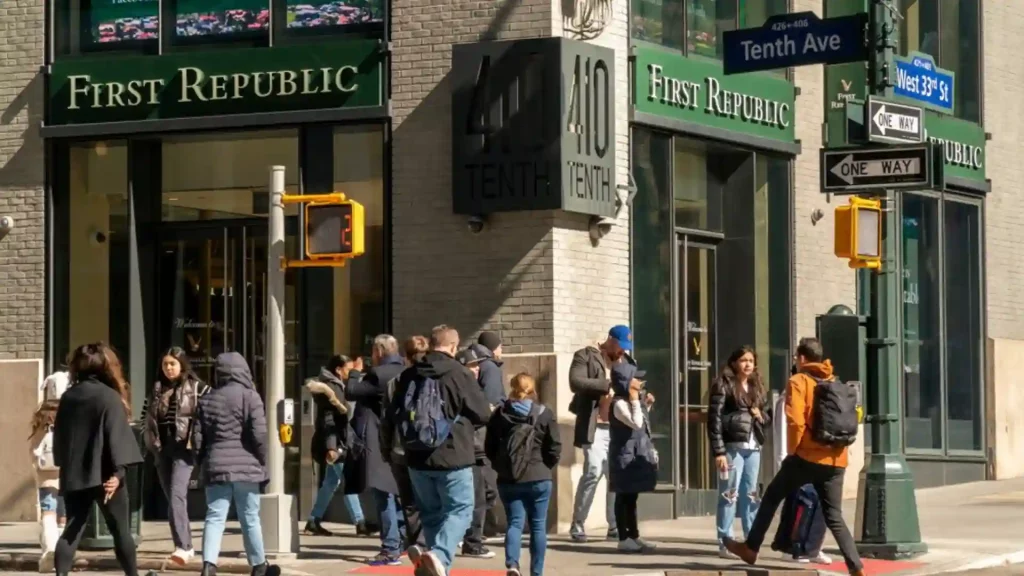First Republic Bank, headquartered in San Francisco, the torch bearer of the regional banking crisis in the United States, has plummeted sharply after Standard & Poor downgraded the credit ratings of the wealth management services provider.
S&P cut First Republic’s credit rating from BB+ to B+ on the weekend. Last week, it gave the tag of junk status to the bank.
First Republic Bank shares tanked 47 percent in the first session after a weekend. This fall adds to the accumulated 90 per cent since the day the Silicon Valley Bank crisis unfolded.
Last week, a few big institutions poured in $30 billion to solve the liquidity issue of the bank. But, these efforts failed to convince the investors to be loyal to the bank.
A group of 11 major US banks came forward to infuse $30 billion as deposits in the First Republic to boost investor confidence and signal a relief package for the depositors. But, these efforts were of no purpose as they got battered in the deepening situation after the collapse of other mid-size US banks over the past few banks.
This rescue deposit, accompanied by downgraded ratings by S&P, brought in a bloodbath in the bank’s stock. The shares of First Republic fell so drastically that the New York Stock Exchange paused stock trading 11 times throughout the trading session.
Amidst the collapse of SVB, followed by the fall of Signature Bank, the shares of other mid-sized banks operating in the category had already tanked. But, when the First Republic shares fell more than 47 per cent, they were trading in green. California-based PacWest Bancorp rose 10.8 per cent, while Zions Bancorp, Comerica and KeyCorp were mostly flat. The SPDR S&P Regional Banking ETF was up 1.2 per cent on the same day.
As per reports from the Wall Street Journal, the JPMorgan & Chase CEO, Jamie Dimon, is heading the discussions with a group of big banks about relief packages to solve the liquidity crisis. David Faber, CNBC, reported that JPMorgan would be advising First Republic on raising capital. Both JPMorgan & Chase and First Republic have denied commenting on developments.
These new deposits, relief packages, short-term loans, invites to PE firms to buy parts of the bank or statements by bank or government officials aren’t working. These are just applying band-aids on a wound that needs an operation.
Downgrading of First Republic and other banks by credit agencies has further exposed them to more vulnerability and has instilled fear in depositors and investors that things still are unresolved. Although the First Republic’s situation appears to be limited, the failure of banks after the collapse of SVB has had a domino effect on the whole industry.
First Republic’s market capitalisation has nosedived by more than 80 per cent in the past 10 days concerning the liquidity crisis due to an anticipated bank run situation. According to an analytics firm, Ortex, short sellers have generated a paper profit of $560 million since the start of the decline in the stocks of First Republic.
The takeover of the Swiss lender Credit Suisse by its arch-rival, the UBS Group, with the government’s backing, has temporarily cooled off the spiralling crisis in the global banking system. This has led the European banks to rebound some of their losses, simultaneously helping the US lenders to rebound after massive declines.
The S&P 1500 regional bank index bounced 0.5 per cent after a sharp fall in the past couple of days. PacWest Bancorp rallied 11 per cent after it announced that its current cash stockpile of $10.8 billion is larger than the sum of uninsured deposits, and the withdrawals have also slowed down.
New York Community Bancorp Inc. gained a whopping 32 per cent after its subsidiary came to an agreement with the US regulators to purchase the deposits and loans of the crisis-struck Signature Bank.
Western Alliance Bancorp fell 6.7 per cent, while the US Bancorp and Fifth Third surged more than 4 per cent.
